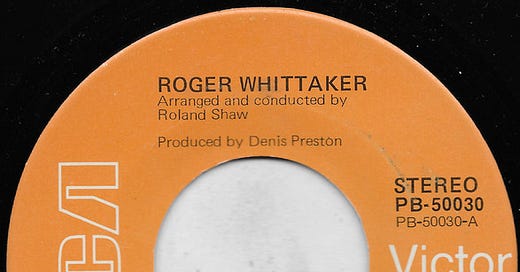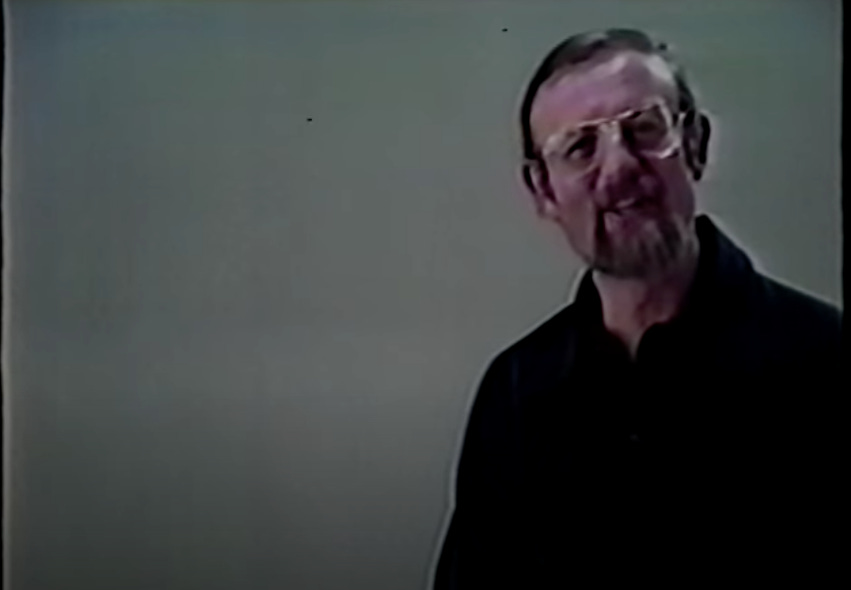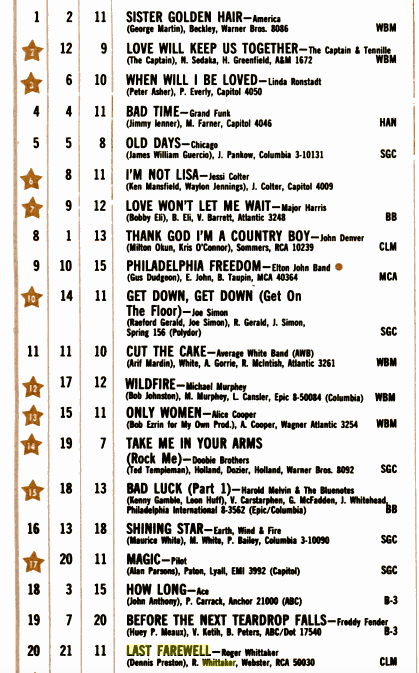When it was announced last week that Roger Whittaker had recently passed away at the age of 87, I was more than a little surprised to learn — as Yogi Berra might have put it — that he was still alive at the time of his death.
Not that I’d ever followed Whittaker’s long-running career closely, nor have I ever been able to readily name more than a handful of his songs. But the guy had already seemed old to me at the height of his fame over 40 years ago, when I learned who he was via this immortal TV ad:
The commercial provided me and my friends with endless grist for the mirth mill. We were all into rock, new wave and a punk, and the very notion of a dude who looked like a Methodist pastor doing a cocktail hour open mic at the Magic Pan being touted for his “exciting music and pleasing manner” sent us into utter hysterics. Ditto for every time the voice-over announced, “Ladies and Gentlemen, THIS is Roger Whittaker!” and the ad would cut to this dynamic visual:
“Tee Vee International have put together twenty of my greatest hits and favorite songs in one new album called All My Best,” Roger would then intone in his patented pleasing manner. “And that’s exactly what it is.” And again the guffaws would erupt.
I honestly can’t recall if I saw the All My Best commercial before I discovered SCTV, or vice-versa. But they have long been inextricably linked in my mind, both because the show so often spoofed the faux sincerity, “Act Now!” urgency and low-budget production values of TV ads like Whittaker’s, and because Whittaker’s voice and “pleasing manner” remind me to this day of a cross between Gordon Lightfoot’s north-of-the-border baritone and Eugene Levy’s drowsy Perry Como impersonation.
And yet… there was something I had kept to myself during those All My Best yukfests — namely, the fact that I actually liked Whittaker’s song “The Last Farewell”. I’d first heard it in the summer of 1975 while visiting my paternal grandparents in San Diego, though I’d had no idea at the time who the singer was. My grandfather loved music, but his tastes veered hard towards the “wholesome family entertainment” end of the spectrum — The Lawrence Welk Show was about as hard as he rocked. I can definitely trace my taste for what we then called “muzak” to our summer drives through the sunny and quiet streets of San Diego’s North Park neighborhood, when the local easy listening station would fill Grandpa Joe’s early ‘70s Buick LeSabre with the soothing sounds of The 101 Strings, Ferrante & Teicher and Herb Alpert and the Tijuana Brass.
“The Last Farewell” was one of the few vocal-oriented tracks the radio station had in regular rotation, though I thought the title must be “You Are Beautiful,” because the chorus hook was wrapped around that phrase. In any case, I was absolutely entranced by the song’s dramatic orchestrations, which sounded like something from a movie — only much later would I learn that conductor/arranger Roland Shaw was best known for his recorded re-arrangements of various James Bond themes — and the lyrics, which sounded like they were from another era entirely. Even at the age of 9, I knew that it had been many a moon since anyone had gone off to war on a ship lying “rigged and ready in the harbor”…
I wouldn’t fall in love with baseball until the following summer, and my first record purchases were still a few years off at this point; in the summer of ‘75, my main obsessions were military history, drawing (usually battle scenes from the Civil War or the two World Wars), and my G.I. Joe collection. So any song that referenced “a wicked war a-blazing,” especially one that seemed to take place in a time distant from our current one, immediately had my attention.
“The Last Farewell” was indeed a song out of time, though not at all in the way I imagined. It had been written and recorded by the Nairobi-born Whittaker four years earlier, with the lyrics provided by Ron Webster, a silversmith from Birmingham, England who was a regular listener to Whittaker’s UK radio show. Though the song was included on Whittaker’s 1971 album New World in the Morning, “The Last Farewell” was initially only released as a single in South Africa. But when radio stations in Canada and Atlanta began playing the album cut in 1974, audience interest in the song inspired RCA to reissue it as a single, which eventually reached #19 on the Billboard Hot 100 in June 1975, and went all the way to Number One on the magazine’s Adult Contemporary chart. Check out the stellar company it was keeping in the June 14, 1975 edition of the Hot 100:
“The Last Farewell” was a massive hit in many other countries, as well; according to Wikipedia, it is one of fifty singles to sell 10 million copies worldwide. The song became an oft-covered easy listening standard — even Whittaker’s RCA labelmate Elvis Presley was moved enough by it to snap out of his post-Fool’s Gold Loaf reverie and record a version.
All of this apparently wasn’t enough for RCA, who dropped Whittaker from the label in 1977, prompting the singer to take his case to the American public via that All The Best TV commercial. And though laugh we did, said ad reportedly enabled him to sell over a million copies of the album. And of course, Chicago TV audiences of a certain age will remember how WGN used the opening bars of “The Last Farewell” as a bumper on their broadcasts, which surely put a few more coins in the pockets of Whittaker’s knit cardigans…
By the time I started playing in bands in the mid-’80s, it had already become fairly common practice for punk and alternative bands to include an exhumed ‘70s hit or two in their repertoire. In addition to ensuring that there was at least one song in your set list that everyone would know, a ‘70s AM gold cover could serve as a cathartic trashing of some godawful shit we’d had to collectively endure on the radio while growing up, or as a guilt-free celebration of a once-reviled song that actually sounded pretty good if you revved up the tempo, turned up the guitars and left the soft sonic trappings of the original recording in the dust.
When I suggested to my Lava Sutra bandmates in early 1990 that we cover “The Last Farewell,” my suggestion definitely stemmed from all three of these impulses. Plus, while there was always a chance that someone else had already beaten you to whichever song you were thinking of covering, I felt like I could be pretty damn certain that no one on the Chicago scene — or anywhere else, for that matter — was playing a raucous, guitar-heavy rendition of this particular Roger Whittaker song.
While I had positive associations with “The Last Farewell” from my childhood, as an adult there was much about the song — specifically the lyrics — that struck me as a little odd. The song is sung from the point of view of a sailor who must leave the love he’s found in some exotic “land of endless sunshine” because he’s been called to war. We learn he’s from England, that he’s a veteran of previous conflicts, and that he loves the person he’s singing to “more dearly than the spoken word can tell”… but we never actually learn a single thing about the object of his affections, other than that they are “BEW-tea-ful”.
He goes on at length in manly fashion about the hellishness of war, bragging about how the prospect of death brings him neither fear nor sorrow, yet he never once mentions any specific memories of the time that he’s shared with this person from these fragrant islands, nor does he even mention one detail or additional attribute of his beloved. There’s no promise of his returning to them, either, nor does he promise to send for his love once the war is over. “Should I return once home again to England, I shall watch the English mist roll through the dale” is the most hopeful outcome he can envisage.
All of which seems remarkably unromantic to me, despite the cloak of courtly romance that the song is swathed in, and despite the narrator’s repeated assertions that he has loved the other person dearly. Maybe the “more dearly than the spoken word can tell” line signifies that he’s from the stiff-upper-lip school, and that any further display or elaboration of love and affection would be unseemly or unmanly. Or maybe the love he’s found in this exotic land doesn’t actually speak much English to begin with, and any additional words of love would be therefore wasted. Or just maybe… the person he’s leaving behind is a guy, which is why all details have been left out and no promises of a future life together have been made.
(I’m not claiming that Webster’s lyrics had homoerotic intent, mind you; but they do leave themselves open to such an interpretation — especially if you grew up at a time when Rear Admiral was regularly playing down the street at the Bijou Theater, maybe on a double-bill with Rigged and Ready, and Rod Stewart was widely rumored to have ended up in the ER after discovering that “blow the man down” wasn’t just a nautical term.)
In any case, I thought it would be fun to blast away at “The Last Farewell” in an arrangement that would really highlight the absurdity and ambiguity of the lyrics, while also doing that whole snarky Replacements thing of “You suffered through this song as a kid — get ready to suffer through it again in a whole different way!” I would not call our version of the song (which I don’t believe we ever recorded in any fashion, though I could be wrong) particularly successful; I do recall seeing a couple of enthusiastic high-fives happening in the crowd when people realized what song we were playing, but for the most part I think my Lava Sutra bandmate Jason — who was also one of the high school friends with whom I spent endless hours laughing about the All My Best ad — got it right when he recently described the audience reaction as “bemused”.
Why we decided to completely dispense with the song’s dramatic opening remains a complete mystery to me — it would have lent itself nicely to some attention-grabbing twin-guitar harmonies, plus our Chicago audiences would have instantly recognized the melody from WGN — as does my decision to deliver that whole “English mist” line in a Marlene Dietrich/Lili Von Shtüpp accent. Some things just inevitably get lost in the mist, English or otherwise.
But cheers to ya, Roger Whittaker. Your pleasing manner made a lot of people very happy, and in my own way I have loved “The Last Farewell” more dearly than the spoken word can tell. Sail on, sailor…








Into the granular Dan! I loved every word and now wondering why you didn't manage to cover "Love's Theme" from Barry White's Love Unlimited Orchestra? Now there's a tune that needs some Metallica-style re-work!
You handle them mitts mighty nicely kid. Ever thought of going pro?